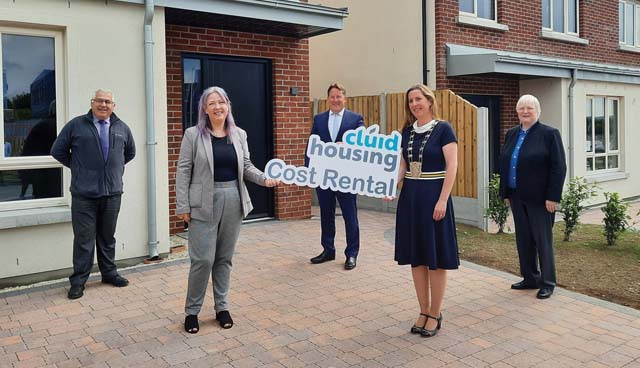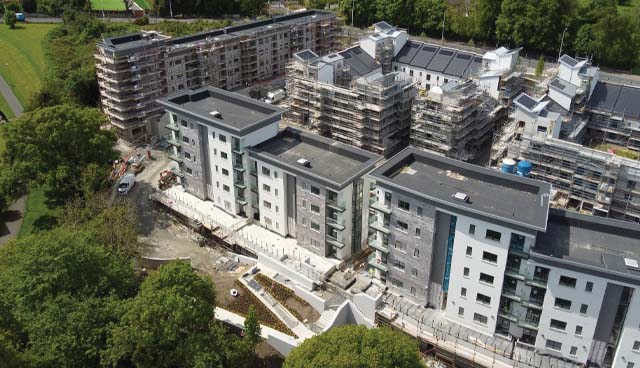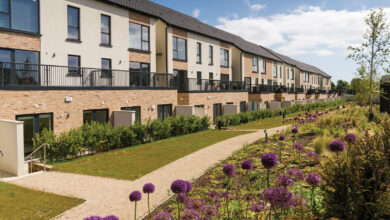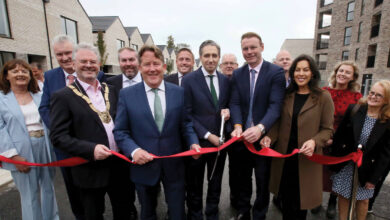Implementing Housing for All

The Housing for All plan is set to deliver for many households and to tackle the complex problems that have been accumulating in the Irish housing sector. The Irish Council for Social Housing (ICSH) welcomes it and, in particular, we are encouraged by the certainty of a long-term and multi-annual plan, writes Director of Policy Karen Murphy.
A Government strategy of this size and scale will require the collaborative efforts of multiple agencies, and the approved housing body (AHB) sector will deploy its efforts towards achieving the commitments and targets in the plan.
The commitments made by the Government reflect the nature of the housing crisis. Housing for All addresses social housing, cost rental, affordable purchase and private housing, and it also commits to ending homelessness by 2030, an EU-wide joint declaration, and implementing specific policies to assist with special needs housing provision.
The new plan identifies AHBs as significant partners in social housing delivery, having played a key role in increasing the level of new social housing in recent years, and it envisions a central role for the AHB sector, with a multi-annual focus set out in new Local Authority Delivery Action Plans.
The recently published Capital Development Plan (2021–2030) and Budget 2022 have now placed the Government’s housing plan on a solid footing with a budgetary commitment of over €4 billion, including €2.6 billion capital exchequer funding, €1.5 billion Land Development Agency (LDA) and Housing Finance Agency (HFA) funding and current funding of €1.4 billion in 2022. 11,820 new homes will be added to the available supply of social housing through build, acquisition and leasing, with a focus on new build (9,000 homes) as well as a funding package for affordable purchase and cost rental homes. All of this adds up to a good foundation for delivery over the coming year and ahead.
Our recent Biennial National Social Housing Conference, held on 22–24 September 2021, and sponsored by AIB, captured the attention of more than 500 attendees. Speakers elaborated on those issues at the very core of a successful housing programme, those which will support — and those that may put at risk — the delivery of affordable and sustainable housing under Housing for All (for speaker presentations, go to www.icsh.ie).
Successful implementation
For a large-scale project with complex objectives, the key to successful implementation will be collaboration and clarity of purpose for all those tasked with the delivery of the plan. Here, the new local authority delivery action plans will build on the strong local authority and AHB partnership. But, as one of our conference speakers said, collaboration calls for all actors on stage, if we’re going to deliver on targets. That means significant funding, labour force enhancements, Land Development Agency engagement and other state agencies with land.
Across all parts of the housing system from the public and non-profit to the private sector, there is a need to provide a stable policy platform so that long term plans can be undertaken with confidence. The risk element in any construction programme can be managed so long as the supporting funding and planning regimes behind them are not subject to frequent change. At our conference, we heard private sector concerns about ‘chopping and changing’ housing policy, and, in relation to Housing for All, fears of the ‘devil in the detail’. Housing professionals want stability, robust legislation and faster decision-making.
To achieve 33,000 new homes annually to 2030, additional capacity in the construction sector will need to be fostered and harnessed. Conference speakers spoke in detail on this, and the construction skills and materials shortage featured in a number of sessions: the annual rate of inflation for construction tender prices is now double pre-Covid levels. We heard from the USA and Singapore on prefabricated models of delivery with room-sized precast components, and modules leaving the factory 90 per cent complete. So, the timeline is faster, more cost-effective, with less building waste and a lower energy footprint. Commitments on training and expanding the construction workforce in Housing for All are welcome, but growth in the modular construction sector is also important. A recent report by Property Industry Ireland states that requiring a percentage of future social and affordable housing to be completed using offsite construction methods would encourage more businesses to invest in offsite manufacturing.
Combatting homelessness
One of the headline commitments in Housing for All is the Lisbon Commitment, which is the goal to work towards ending homelessness by 2030. This is certainly welcome and the adoption of a housing-led approach, including a continued expansion of the Housing First model, will be vital elements to the response. The importance of community inclusion and integration was a discussion point at our conference under a number of themes, with EU supports, such as the European Social Fund, flagged as an important funding source for ancillary social services that help support sustainable communities.

“Our recent Biennial National Social Housing Conference, held on 22–24 September 2021, and sponsored by AIB, captured the attention of more than 500 attendees. Speakers elaborated on those issues at the very core of a successful housing programme, those which will support — and those that may put at risk — the delivery of affordable and sustainable housing under Housing for All.”
Cost rental tenure
In response to calls by many to introduce a subsidised cost rental tenure, Housing for All commits to an average of 2,000 new cost rental homes every year with rents targeted at least 25 per cent below market level. AHBs have already begun providing cost rental housing, with tenants moving into their homes in 2021. The non-profit AHB model of provision works particularly well for cost rental, and can work as an important stabilising element to our housing system.
Housing system lifecycle
Demographic projections pose challenges for policy and how we organise our institutional responses socially and economically. The ICSH has long campaigned on the need for supported housing options for older people and disabled people, but gaps still remain in terms of an adequate supply of appropriately designed homes and supported housing complexes. Housing for All is informed by the 2019 Housing Options for our Ageing Population Policy Statement, which recommends that 30 per cent of all new dwellings are built to incorporate universal design principles; this is to be welcomed. Housing associations have demonstrated how better value for money can be achieved in preventing early admittance to hospital or residential care through supported housing. A framework for the delivery of appropriate housing for older persons and disabled people should be included as part of the housing delivery plans of each local authority.
Climate, sustainable development and retrofitting
The implementation of the Climate Action Plan is dependent on all sectors of society playing their part. In the housing sector, there are targets for a large-scale deep retrofitting of stock to improve energy efficiency. Under Housing for All, there is a commitment to introduce a targeted retrofit scheme for AHBs as part of the national response to climate change. The sector is keen to begin this work with the right funding package in place to support it.
Socially and economically inclusive housing system
The ongoing crisis across all parts of our housing system is untenable. Our conference opened with speakers identifying deeply embedded structural obstacle as well as emerging risks. Housing professionals who spoke from both the public and private sector perspective agreed that supply without affordability is unsustainable. The long-term implications for our nation’s health, security and well-being must be prioritised in any plans to deal with this crisis. Housing for All will require both sustained resources and, critically, co-operation if it is to be effective.
Under Housing for All and beyond, we believe we can at least double the number of homes under AHB management by 2030 to provide greater affordability across the housing system. Providing housing as a social good is fundamental to the work of our approved housing body members.
E: karen@icsh.ie
W: www.icsh.ie






